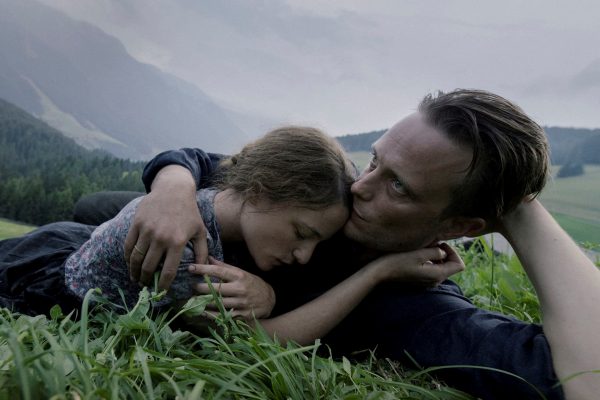One should not enter into a Terrence Malick film lightly. The visionary film maker, who began his career with the incredible debut Badlands in 1973, treads the line between auteur and artist. His work is impeccable; crafting films that have steered away from the traditional form and narrative, into a wholly unique but identifiable style. Whilst not always successful and often impenetrable to the average audience, his films are always an event.
A Hidden World recounts the true story of Franz Jägerstätter (August Diehl), a humble farmer, and conscientious objector during World War II, Living in the almost impossible idyll of the Austrian mountains. Aside from working the land, tending to minor duties in the local church and living in familial bliss with his wife and three daughters, Franz must contend with the rise of fascism, the ever-encroaching spectre of military service, and the threat of prison for refusal. But equally this is the story of his wife, Fani (Valerie Pachner) standing up to the bitterness of the townsfolk, the social shunning of the family and facing the dual warring egos of her own sister (Maria Simon), and Franz’s ageing mother, Rosalia (Karin Neuhäuser).
Considering that since the release of 2011’s The Tree of Life, Malick’s films have increasingly eschewed conventional narrative and plot, in favour of a dreamlike combination of voice-over and stolen snatches of momentary existence, the choice to return to a more traditional story is a welcome one. However, despite this being a directly told story, there are barely a handful of what would be considered conventional “scenes”. Little of the dialogue progresses the story, instead merely giving tone and texture to the individual snippet being shown. While individual moments of unmistakable realism feel captured almost by accident, the surrounding tissue nevertheless feels substantive. This is in great part due to Pachner and Diehl’s excellent performances, and support from a solid cadre of European character actors. The film also notably features the final performances of the late, great actors Michael Nyquist and Bruno Ganz.
It’s still a difficult experience, especially at a run-time of nearly three hours. A Hidden Life manages to encompass both the best of Malick’s style, and frustratingly, also some of the worst. Within the story there’s a sense of repetition to events, that becomes mildly irritating, particularly in the many scenes of Fani and the children being excluded or insulted by other villagers. Similarly those with a low tolerance for experimental or art house cinema would be advised to perhaps start out with an earlier Malick entry, such as The Thin Red Line or The New World.
That said, Malick is a genius all of his own, and while this isn’t his greatest work, it’s still a staggering film, visually breathtaking, and with a deep and resonating score from James Newton Howard, that compliments the bleak cruelty and pastoral wonder of the story in equal measure. Similarly, the visuals are as ethereal and abstract as they are earthy and grounded. Yet despite the signature constantly moving handheld camera close-ups, interminable shots of people walking or dancing away from camera, and hard cuts to swaying trees and fields of grasses, it’s a powerful and evocative experience.
@Filmhouse, Edinburgh until Thu 30 Jan 2020
